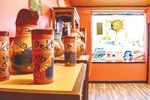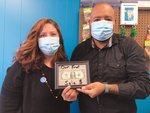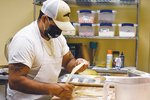






Editor’s note: All interviews for this story were conducted in Spanish.
Few would dare to risk a career change during a pandemic that has suffocated America’s economy and left millions without work — yet, that’s exactly what Pittsboro resident Jimmy García decided to do.
Up until September, García, a native of San Luis Potosí, Mexico, worked in high-rise window cleaning. Today, he owns and operates a Hispanic shop — Tienda Hispana El Rayo — with his wife, Tanya. The store opened on Oct. 16 at 119 Hillsboro St. in Pittsboro in the former location of an insurance agency.
“(I wanted) to have more opportunity and be with my family because if there’s an emergency, we can close,” Garcia said. “For anything that we need, we can close for a little while, go home, return. In the job I had before, I had no possibility of leaving early.”
Named after Los Rayos, García’s favorite soccer team, Tienda Hispana El Rayo lies nestled between Circle City Books & Music and Deep River Mercantile. Out in the walkway, a big sign lies in front of the shop’s double-door storefront, telling passersby, “Estamos ABIERTOS,” or “We’re OPEN.”
On the inside, the store’s a bundle of art, food and colors.
“We have crafts, paintings that my wife paints,” García said. “We have money transfers, pan dulce (sweet bread) and food. There’s a little bit of everything.”
Sweets, snacks and chips — priced cheaply for children — line shelves in a room in the back of the shop. To the right, several tables display colorful, handcrafted ceramics and a few small paintings. Close to the window, a blue donkey wearing a floral necklace winks at you.
Painted by Tanya, she’s as blue as the walls that surround the cash register and a display case of decorated masks, pan dulce and sugar skulls — small, decorative skulls used in Day of the Dead celebrations.
“I want people to come in and feel happy when they enter and see the colors,” Tanya said. “That’s why I paint and make everything with a lot of colors because they make me feel better in times like we’re in right now.”
Many items on display were locally made, including the store’s cloth masks, paintings and even keychains. Some friends and community members leave their handcrafted or hand-painted products with the Garcías and receive part of the proceeds if the items sell. That’s part of the store’s purpose, according to the Garcías — to serve the needs of the local Hispanic community.
“What we wanted to do is do something that the community needed,” Tanya said. “We haven’t had any Hispanic stores here in Pittsboro I think for nearly 11 years ... Everyone has to go to Sanford or Siler City or Wake County to buy things.”
She said that’s why they always ask anyone who enters the store: “What do you need? What are we missing?”
Even now, García said they’re still looking to increase their inventory, and right now, spices are at the top of the list.
About a month in, business has been a bit slow, even as Gov. Roy Cooper gradually lifted COVID-19 restrictions on businesses in September and October.
“We waited until after they passed all the rules,” Tanya said, “so (the restrictions) didn’t affect us much.”
Instead, García said their biggest challenge has been letting the community know they’re here — and where they are.
“There are times or hours that people don’t come in and others last for a while, two hours, when nothing happens. It’s slow,” García said. “A lot of people say, ‘We know there’s a Hispanic store, but we can’t find it.’ Well, it’s hard because if people don’t walk by here, they don’t see the shop.”
It’s not just people; Google Maps still can’t find them by name either. That’s why the Garcías began putting up signs in the walkway and on the windows. They’ve also created several social media accounts and posted a few videos just to show people where they’re located and what the shop looks like.
“I think a lot of people pass by and ask, ‘What’s that?’ but they don’t want to enter,” Tanya said with a laugh.
“Or some people come in and say, ‘Do you have take-out?’ They think it’s a restaurant,” García added. Later, he joked: “Maybe I need to put out some food to attract more customers.”
As winter approaches and as COVID-19 surges across the country, both are a bit worried about what lies next, but they’re also optimistic about the shop's future.
“We’re earning much more than I thought we would at first,” Tanya said. “The community, the friends we have here have contributed a lot.”
“Many people have told us, ‘Wow, it’s great that there is a store where we don’t have to go any further to send money, to buy bread, to buy things,’” García added. “It’s important that the people who enter tell us those things so that one feels better about moving forward.”
‘Nearly at the point of not opening anymore’
Tienda Hispana El Rayo isn’t Chatham’s only new Hispanic business. In Siler City, Mexican immigrant Bernardo Gallegos Rodríguez recently opened a bakery, named Panadería y Pastelería Melanie — or Melanie’s — after his youngest daughter.
But his experience setting up shop was nearly the exact opposite of the Garcías’: While he had the clientele and name-brand recognition, the pandemic’s restrictions and closures nearly thwarted his expansion into Chatham County.
Gallegos Rodríguez, 39, set up a bakery — the first Melanie’s — in Biscoe around eight years ago. He first thought of expanding to Siler City about five or six years ago while bringing bread to a Mexican shop called La Posadita.
“(The town) caught my attention,” he said, but he didn’t act on it until 2018, when he rented out space to sell bread in Siler City’s Compare Foods, a Hispanic supermarket chain.
When the pandemic arrived, the owners no longer wanted to rent out space, so Gallegos Rodríguez moved his business to his current address — 224 N. Chatham Ave. So, when he opened on Sept. 18, he already had a loyal customer base, the majority of them Hispanic, who had followed him downtown. Since he’s been downtown, he said he’d even picked up new customers.
“Many people who didn’t buy bread (in Compare Foods) come here to buy bread,” he said, adding, “A lot of Americans already come here, so it’s much better here than over there in Compare Foods.”
Business has been great, he said, and he’s not at all worried he’ll have to close.
“Despite the fact that we’ve only been open for two months, it is profitable,” he said, adding, “As a business owner, it’s calm, it’s maintaining itself … What helped us is that a lot of people already knew us. They already knew the name of the bakery.”
But it was incredibly hard to get to that point, Gallegos Rodríguez said. After moving his business downtown, he spent nearly five months trying to secure the fire and sanitation inspections he needed to open. But since COVID-19 forced most government offices to close or curtail services, nobody responded to his inspections requests.
“So I was nearly at the point of not opening anymore,” he said.
He kept calling and calling — only to be told nearly every time to call another number, which only resulted in an unending stream of phone numbers and missed calls.
“I filled out a sheet with numbers,” he said, adding, “You call this person, that person. Then there’s no response from anyone, and if there’s not, they give me a name, another name, someone here, someone there. The moment does come when you say, ‘No, you are already too stressed out,’ and you say, ‘No more.’”
All the while, he continued renting a building he couldn’t yet use, and COVID-19 had hurt his Biscoe bakery’s bottom line. He was just about to pull the plug when “a light opened at the end of the tunnel.”
He finally heard back from county building, fire and health department inspectors. They came within a few days and completed the required inspections, which allowed Gallegos Rodríguez to finally open his shop in mid-September.
“It’s difficult in itself to open a business outside of a pandemic,” he said, especially since he doesn’t speak English. “(During a pandemic), the difficulty triples because, man, nobody gives you an answer … and you don’t even know what to do. But, well, here we are. We opened.”
There will always be good times and bad times, he said, and you’ve just got to seize opportunity whenever it comes knocking.
“The same opportunity (to expand) might not have presented itself again,” he said. “The opportunity came at a bad time, and sure, it was a bit difficult because I had just suffered a great loss. But we have to keep moving forward. There’s no other way; we’ve got to keep going.”
Reporter Victoria Johnson can be reached at victoria@chathamnr.com.